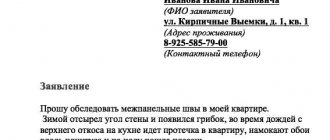4,25
5
| Reviews: | 8 | Views: | 25337 |
| Votes: | 8 | Updated: | n/a |
File type Text document
Document type: Application
?
Ask a question Remember: Contract-Yurist.Ru - there are a bunch of sample documents here
(SAMPLE) APPLICATION FOR REFUSAL OF AN INHERITANCE IN FAVOR OF ANOTHER HEIRS To the ________________________________ notary office of the city __________ from _______________________________ (full name) residing at the address: __________ __________________________________ APPLICATION for renunciation of an inheritance in favor of another heir I, _______________________________, renounce the share of inheritance due to (full name) me in the property ____________________________________, (full name, degree of relationship) of the deceased “__”______________ 20___, in favor of ________________________ (full name, _____________________________________ degree kinship) “__”___________ 20___ ________________ (signature) COMMENTS: ———— According to Art. 550 of the Civil Code of the RSFSR, the heir by law or by will has the right to refuse the inheritance within six months from the date of opening of the inheritance. Refusal of inheritance is allowed both in favor of other persons from among the heirs by law (Article 532 of the Civil Code of the RSFSR) or by will (Article 534 of the Civil Code of the RSFSR), and in favor of the state or a specific state, cooperative or public organization. There are no restrictions and renunciation of inheritance in favor of other heirs is allowed, regardless of their turn in inheritance by law. Refusal of an inheritance is permissible in favor of one or more heirs, and the person renouncing the inheritance has the right to indicate the shares due to them. If the heir, having refused the inheritance, does not indicate in whose favor he refused, his share goes equally to the heirs who accepted the inheritance (Article 551 of the Civil Code of the RSFSR). If the only heir refuses the inheritance, the inheritance goes to the state. An application for renunciation of inheritance must be formalized by a notary. Otherwise, if the deadline for submitting it is missed, it will not be accepted, since the six-month period for this type of transaction is preemptive and cannot be extended even in court. An application is submitted to the notary office at the place where the inheritance was opened. Refusal of an inheritance is not permitted if the heir has previously submitted to the notary office at the place where the inheritance was opened an application to accept the inheritance or to issue him a certificate of right to inheritance. On the other hand, if the heir refuses the inheritance, he cannot accept it. Refusal of inheritance can only be declared by a legally capable person. Parents (adoptive parents) can abandon heirs for minor heirs on the basis of Art. 133 CoBS of the RSFSR, but only with the consent of the guardianship and trusteeship authorities (local administration). The law prohibits refusal of inheritance in favor of persons who are not heirs, or who are deprived of the right to inherit by directly indicating this in the will, or by being recognized as unworthy heirs (Article 531 of the Civil Code of the RSFSR). Partial refusal of inheritance is not allowed. It is also not allowed to replace one application for renunciation of inheritance with another. If the refusal of inheritance took place under the influence of deception, violence, delusion, threat or other illegal action, entailing the invalidity of the transaction in accordance with the norms of civil law, then it may be declared invalid in court.
Download the document “Sample. Application for renunciation of inheritance in favor of another heir"
Drawing up an application for renunciation of inheritance
A sample application for renunciation of inheritance in full, without specifying specific persons, looks similar to the example posted above. Only after the date of death of the testator is the application completed.
Refusal of inheritance is possible only in respect of all property. For example, you cannot refuse an apartment with debts, but accept a car. There are exceptions to this case when there are several grounds for inheritance. For example, by law and in the order of hereditary transmission. For each reason, the heir makes an independent decision.
Procedure for renouncing inheritance
You can refuse an inheritance within 6 months after its opening - the death of a citizen or the entry into force of a court decision declaring him dead. Special deadlines apply:
- when the right of inheritance arose only due to the fact that the heir did not accept the inheritance. There are 3 months after the end of the 6 month period
- when the right to inherit arises due to the refusal of the heir, his removal. There are 6 months from the date of refusal of the previous heir
- in the order of hereditary transmission during the period of such transfer of rights, which we described in detail in the corresponding article.
The algorithm for refusing inheritance is as follows:
- a statement is drawn up. It can indicate specific persons from among the heirs by will or by law of any order, hereditary transmission or heirs by right of representation. Such heirs should not be considered unworthy or deprived of inheritance. Or you can refuse without specifying specific persons, then the property due will be divided among the remaining heirs in proportion to their shares.
It is impossible to refuse an inheritance in favor of third parties who are not the heirs of the given testator; it is not allowed to refuse a part of the inheritance due or under conditions or reservations (for example, by fixing the obligation to take some kind of reciprocal action, for example, to allocate a share in an apartment). If there are several grounds for entering into an inheritance (for example, by will and by law), then you can refuse either on one of the grounds, or on several of them, or on all of them. This circumstance must be taken into account when drawing up an application.
– an application for refusal of inheritance is submitted to the notary at the place of opening of the inheritance (or to the official authorized to issue certificates of the right to inheritance). It is submitted in person upon presentation of an identification document (passport of the Russian Federation or a foreign country), sent by mail (the signature on the application must be certified by any notary), through a representative (the power of attorney must reflect the right to refuse inheritance). Legal representatives of minor children have the right to refuse inheritance only with the consent of the guardianship and trusteeship authority. Such consent will also be required when making a decision when the heir is declared incompetent or partially capable.
How to properly formalize a waiver of a share of an inheritance
» Sample application for inheritance September 03, 2020
How to correctly formalize a refusal of inheritance?
Anonymous June 8, 14:21
Hello. My father died, and there were some savings left in the savings book. Three direct heirs - me, sister and mother. I want to give up my share. Is it necessary to formalize the waiver notarized? If so, should I write a renunciation of my part of the inheritance or, for example, a renunciation in favor of my sister? And can my mother or sister withdraw the entire amount of savings from the savings book without my participation?
Marina Zelmer. expert June 8, 23:31
1. Is it necessary to formalize the waiver notarized? - you have the right not to accept the inheritance, then you simply do not take any actions aimed at accepting the inheritance, that is, you simply do not contact the notary.
2. should I write a renunciation of my part of the inheritance or, for example, a renunciation in favor of my sister? - you have the right to refuse the inheritance both in favor of other persons and without specifying the persons in whose favor you are refusing the inherited property (Clause 1 of Article 1157 of the Civil Code of the Russian Federation). Also according to Art. 1157 of the Civil Code of the Russian Federation, the heir has the right to refuse the inheritance within the period established for accepting the inheritance (6 months), including in the case when he has already accepted the inheritance. The renunciation of inheritance cannot be subsequently changed or taken back. According to Art. 1158 of the Civil Code of the Russian Federation, the heir has the right to refuse inheritance in favor of other persons from among the heirs by will or heirs by law of any order, regardless of the call to inheritance, who are not deprived of inheritance, as well as in favor of those who are called to inherit by right of representation or by inheritance transmissions. Refusal in favor of any of the specified persons is not allowed: from property inherited under a will, if all the property of the testator is bequeathed to his appointed heirs; from an obligatory share in the inheritance; if an heir is assigned to the heir. Refusal of inheritance in favor of persons not specified in paragraph 1 of this article is not permitted. Refusal of inheritance with reservations or under conditions is also not allowed. Refusal of part of the inheritance due to the heir is not allowed. However, if the heir is called to inherit simultaneously on several grounds (by will and by law or by way of hereditary transmission and as a result of the opening of an inheritance, etc.), he has the right to refuse the inheritance due to him on one of these grounds, on several of them, or for all reasons.
3. And can my mother or sister withdraw the entire amount of savings from the savings book without my participation? - the heir can withdraw a sum of money from the account, which is the inheritance estate, only upon presentation of a certificate of the right to inheritance in the amount of the share due to him. That is, if you do not accept or renounce your share of the inheritance, then you will not have the right to receive funds in your father’s accounts.
Do you have any questions? Ask, the answer will follow immediately!
How to confirm the refusal of a share of the inheritance
When acquiring inheritance rights to certain property, regardless of its type - movable or immovable. each heir has the opportunity to formalize the procedure for refusal in relation to the received property
The need for renunciation in the vast majority of cases is determined by the fact that in addition to rights, the heir also additionally receives the debts and obligations of the deceased. Moreover, their size can be significantly greater than the value of the property.
Therefore, when such a situation occurs, it is necessary to know the key features and possible consequences that are inherent in the procedure for refusing an inheritance.
Actions according to the law
The lack of desire to acquire property by will or law can be realized through the refusal of inheritance provided for by law. In this case, the basis for inheritance is not important - any citizen has the right to carry out such an operation, and no one can restrict him in this.
However, it is important to understand that the recipient must formally renounce all assigned property. In other words, the law does not provide for the presence of reservations or conditions.
If the heir is entitled to property for several reasons reflected in the Civil Code of the Russian Federation. then he has the right to selectively accept values in accordance with his preferred option. The recipient can also formalize a waiver of the inherited property on one or all grounds. But at the same time, he cannot renounce a specific share of the inheritance. In practice, such situations are regulated through a notary.
To refuse, you need to submit an application to a specialist indicating the part of the property to be refused, as well as its future fate - this will avoid confusion in the future
Notes on the Will
Before completing the opt-out procedure, it is important to understand that it cannot be canceled after this has been done, so you should carefully consider the need for this option.
In addition, there are some nuances when renunciation is completely impossible. For example, a minor or incompetent person cannot independently implement this. In this case, they will need permission from the guardianship and trusteeship authorities.
But even after the process is fully completed, the refusal of the will may be considered invalid.
To do this, you must have one of the reasons approved by law:
- if the procedure was carried out under misconception or deception from third parties
- if the person at the time of renunciation could not understand his actions, as well as manage them
- if the renunciation was carried out under threats or violent acts.
- information about the legal specialist handling the case
- information about the testator
- information about the applicant
- list of inherited property
- list of persons entitled to receive property - refusal can be implemented only in favor of the heir or unconditionally
- the applicant is also required to indicate that he does not want to accept part of the inheritance
- date and signature.
- minor children of the testator
- disabled adult children of the testator
- the testator's disabled parents
- disabled citizens who were dependent on the testator.
- the person is incapable of working
- receives full security from the testator
- does not have any other means to function.
- long-term hospital stay
- imprisonment
- living abroad.
These points also apply to the will itself. If one of these provisions is proven during the trial, the document loses its legal force, and the heirs receive the property in the order of priority established by law.
In favor of whom to transfer rights
It is possible to formalize a waiver of the right of inheritance in favor of other citizens only when the recipients are heirs by law or by will. Moreover, it is worth considering that the other person should not have previously been deprived of this right.
Also, abdication cannot be implemented in favor of minors or incompetent persons without the appropriate consent from state guardianship and trusteeship authorities.
Waiver of inheritance rights in favor of another person means that the transfer of property will be carried out in full from the intended property. In accordance with the provisions of regulatory legal acts, it is not possible to refuse only a separate part of the property due.
This is provided for cases where the heir acquires only assets, while not wanting to accept the debts and obligations of the testator.
Sample renunciation of inheritance share
In practice, renunciation of inheritance occurs quite often. Each situation has its own particular characteristics and reasons: family circumstances, financial problems, lack of desire to acquire unnecessary property.
Regardless of the grounds, it is necessary to comply with the basic rules for registering a refusal. The beginning of the procedure is marked by the heir submitting a special application to the notary’s office. You must pay for a lawyer's services - the price depends on the branch.
The state does not provide a specific format for the document, but you can ask for a sample at any notary office.
In particular, the following information must be reflected on paper:
Once again, it is worth noting that the waiver of a share of the inheritance cannot be canceled or changed in the future. And civil law prohibits the introduction of any reservations or conditions into the abdication procedure - rejection of an inheritance can only be made in full. Otherwise, the application will not be accepted by the notary.
Which part is mandatory
In inheritance legislation, there is the concept of a mandatory share - this is a part of the inherited property that is intended for specific persons, regardless of whether they are indicated in the will or not. It is necessary to support disadvantaged categories of the population.
The rights and reasons for receiving an obligatory part of the inheritance are ensured by Article 1149 of the Civil Code of the Russian Federation.
This provision contains basic information about persons entitled to receive a portion of the inherited estate:
All pensioners who receive a pension according to age criteria have the status of disabled people, so they are obligated to receive a share even without a will. In addition to them, persons with any disability group, as well as all minors, can apply for this - although their occupation is not considered important: they work, study, or do nothing at all.
It is worth considering that the mandatory share is not provided by law, since in this case the order of priority reflected in Chapter 63 of the Civil Code of the Russian Federation is relevant. The point in question can only be realized if there is a testamentary document.
To exercise inheritance rights, it is necessary to accurately establish the time of opening of the inheritance.
If the deadline for accepting an inheritance has been missed, see what to do in this publication.
To establish rights to an obligatory part of the property, the permission of other heirs is not considered mandatory. It is also not important whether the person with the corresponding rights previously lived with the testator. The fact of running a joint farm is not taken into account.
In the case of a dependent, three conditions must be met:
Also, Chapter 63 of the Civil Code of the Russian Federation establishes the size of the obligatory share - it is exactly half of the part that the heir could count on by law in the absence of a will.
If the document specifies only a part of the inheritance from the entire property of the testator, then the obligatory share is determined from the unused property. In case of insufficiency, the bequeathed property is used again.
Nuances after 6 months
The legislation defines specific deadlines for entering into and renouncing inheritance rights. Therefore, the heir should take this fact into account and adhere to the time frame. Since in case of violation of the established dates it will be impossible to refuse the property.
The deadline is set as follows:
The opportunity to refuse an inheritance in favor of other persons after acquiring the corresponding rights can be exercised only in exceptional cases established by law.
Therefore, before using such a procedure, it is necessary to carefully study the current provisions of the law and real cases from judicial practice. Such precautions will allow you to avoid numerous mistakes and problems with government agencies in the future.
It is important to understand that it is practically impossible to renounce the inherited property after 6 months, and then the heir will have to fulfill the obligations of the testator, as well as manage the acquired property according to the established rules
The maximum amount of information on this issue can be gleaned from Article 1155 of the Civil Code of the Russian Federation. In accordance with the provisions of this act, renunciation of a share of the inheritance after the expiration of the terms can be carried out only in two cases.
If the reasons that prevented the formalization of the renunciation on the established dates were recognized by the court hearing as valid.
Examples include the following situations:
Also, the period may be extended if it is proven that the heir was not aware of the death of the testator and the circumstances of the will.
If there are sufficient grounds to restore the opportunity to refuse the inheritance even after the expiration of 6 months, it is necessary to file a corresponding statement of claim with the judicial authorities at the place of residence of the testator or at the location of the property due.
It is important to understand that to prove valid reasons, you must provide certain documents. However, before implementing the renunciation of property, it is important to take into account that the renunciation occurs entirely of the entire inherited mass and cannot be made with reservations or subsequently canceled.
Such an interpretation means rejection of the entire inheritance, including that of which the applicant was not aware.
For example, he has information about the apartment he is owed and carries out the registration of refusal of it. But the testator also had a contribution, about which the heir knew nothing. Therefore, in the event of renunciation of property in favor of another person, the rights not only to real estate are transferred, but also to the deposit in a credit institution.
Moreover, it is worth understanding that these points are not considered sufficient grounds for reinstating the deadline, invalidating the refusal or other legal actions. Therefore, when renouncing, it is also necessary to analyze possible additions.
In addition, you will need to take into account significant nuances. For example, if the court decides not to grant the extension of time, you can appeal to a higher court.
Also, if a relative was found unworthy to have the right before the conclusion of the will, but he appears in it as an heir, then the law allows for the possibility of abandoning the property in his favor.
So, renunciation of the inherited mass is quite real according to the provisions of the legal system of the Russian Federation. However, it is worth considering that there are certain restrictions and conditions, compliance with which is necessary to achieve this goal.
For example, the timing of refusal is of key importance - usually they are limited to 6 months after the opening of the inheritance. If they are violated, achieving the possibility of renunciation becomes extremely difficult. Therefore, it is recommended to initially analyze all the information about such a procedure, as this will avoid significant errors in the future.
Since the opening of the inheritance
The heir is given only 6 months to make a decision and formalize it.
From the moment of renunciation of inheritance rights
Refusal of inheritance in favor of another heir: how to write an application
Among the rights recorded in the Civil Code of the Russian Federation, there is also the right to refuse inheritance. It is regulated by Article 1158. If, due to some circumstances, a citizen does not want to accept property that should pass to him from the deceased, he has the right to write a refusal. The paper is drawn up according to certain standards. Next, we will consider in what cases it is possible to draw up such a document, and a sample is available for download at the end of the article.
What is the document
According to the Civil Code of the Russian Federation, accepting an inheritance is not an obligation, but a matter of choice. Refusal is documentary evidence that the citizen does not agree to accept the property, rights and obligations that are transferred to him from the deceased. It is drawn up in the form of an application. The document is submitted to the notary who conducts the inheritance case.
Important! It is recommended to draw up an application following the advice of lawyers and ready-made samples. If the approved rules are not followed, the document may not be accepted for production.
The application for refusal of inheritance has two types:
- Unconditional (without specifying another heir). In this case, the shares of the remaining persons will be increased.
- In favor of another heir. Limited to persons claiming the property of the deceased by law or by will. Moreover, even an heir who did not come through the order can receive a share.
It is worth noting that refusal of part of the inheritance is not allowed. As an example, the heir cannot accept the house and refuse to pay the debts of the deceased. In the text of the document, a citizen can list the specific composition of the property that will be transferred to the benefit of another person.
Sample for drawing up an unconditional refusal
First, we present a plan according to which an unconditional refusal is drawn up. This statement does not indicate specific persons to whom the share will be transferred. However, civil law allows the filling out of such a form.
- The design starts from the top right corner. Enter the data of the notary's office, where the application for refusal of inheritance is sent.
- Information about the applicant is recorded - his full name and place of residence.
- The name of the form is indicated in the center.
- Main text. It is written in the first person, states the fact of renunciation of a share in the citizen’s inheritance, and indicates the full name and date of death.
- Number and personal signature of the applicant.
When confirming, it is important to remember that the signature on the document must match the sample in the passport.
How to draw up a refusal in favor of another person
Another situation is that you need to write a waiver of inheritance in favor of another heir. In general, the content of the written form will change little. Corrections will only need to be made to the main text.
- At the top right is the notary office that formalized the inheritance matter.
- Below are the details of the person who issued the document (full name and place of residence).
- In the center is the name of the form.
- Main text. First, the fact of death is stated and the date is given. The composition of the property left by the deceased is prescribed. Non-acceptance of the inheritance is indicated by entering the details of the person in whose favor the property is transferred.
- Personal signature of the applicant and date of preparation.
According to the Civil Code of the Russian Federation, issues of accepting an inheritance and refusing an inheritance are a matter of choice, and not a requirement of the law. Meanwhile, the citizen in whose favor the application was written also has the right to refuse to accept the share.
In what cases is it impossible to formalize non-acceptance?
Although the Civil Code of the Russian Federation provides for the possibility of refusing a share in an inheritance in general cases, in a number of circumstances this will not be possible. Let's list a few examples.
- The testator assumed that the heir could refuse his share and made a will in which he designated another citizen to take the place of the one who refused.
- An obligatory share is inherited.
- It is impossible to write a refusal in favor of a person deprived by the testator of the right to inherit.
- It is impossible to write a statement of refusal of inheritance in favor of a person recognized as unworthy.
As already mentioned, it is impossible to refuse part of the share of the inheritance. However, there is an exception to this rule.
Sometimes inheritance occurs simultaneously for different reasons (for example, property passes to a citizen by law and by will). In this case, according to the Civil Code of the Russian Federation, he has the right to choose on what basis he will accept the inheritance and on what basis he will refuse. Continuing with the example, a citizen accepts an apartment according to a will and refuses bank deposits transferred to him by law.
When filling out the application form, the heir is not required to indicate for what reasons he is renouncing the inheritance in favor of other persons. It is worth noting that it is impossible to take the document back and accept the property again. Therefore, before formalizing a refusal of inheritance, you should carefully analyze all the advantages and disadvantages of this decision.
A few subtleties you need to know
For many heirs, an interesting question is: how much does it cost to renounce an inheritance from a notary? There are no uniform prices for notarization; they may vary depending on the region. The registration price is not affected by the value of the property. In general, the notary will charge about 1000 rubles.
If the heir who plans to renounce the property is an incapacitated person (or partially capable), before drawing up the paper, you will need to obtain permission from the guardianship and trusteeship authorities. They will be able to confirm that such an action does not infringe on the applicant’s rights.
The procedure for writing a refusal differs in the case of inheritance under a will. Such a citizen can sign it only in favor of the person designated by the testator. In all other cases, the application will be considered unlawful.
If a citizen received the right to property as a result of the refusal of another heir, according to the Civil Code of the Russian Federation he is also not obliged to accept it. Even in such a situation, this is done only on a voluntary basis.
The law provides for the possibility of refusing an inheritance. To do this, the citizen needs to write a corresponding application and send it to the notary in charge of the inheritance case. For a document to be accepted, it must meet certain requirements. Next, you can download a sample application for refusal of inheritance.
Recommended reading
Voluntary agreement to pay alimony
Where can I get a certificate of family composition?
Refusal of inheritance for monetary compensation
QUESTION: My brother and I are the heirs of the first stage. There is an apartment as an inherited property. We agreed that I would write a waiver of inheritance in favor of my brother, for which he would pay me monetary compensation after receiving a certificate of inheritance. I agree to these conditions. Is it possible to renounce an inheritance for monetary compensation? How can I properly formalize a deal with my brother, so that after I submit a statement of renunciation of inheritance to the notary, he cannot evade paying compensation, or, if he refuses to pay, I have the opportunity to recover this amount of money from him?
ANSWER: By virtue of clause 1 of Article 1157 of the Civil Code of the Russian Federation, the heir has the right to refuse the inheritance in favor of other persons (Article 1158) or without indicating the persons in whose favor he refuses the inherited property. According to clause 1 of Article 1148 of the Civil Code of the Russian Federation, the heir has the right to refuse inheritance in favor of other persons from among the heirs under a will or heirs by law of any order, regardless of the call to inherit, who are not deprived of inheritance (clause 1 of Article 1119), as well as in favor of those who are called to inherit by right of representation (Article 1146) or by way of hereditary transmission (Article 1156). Based on these provisions, the heir has the right to refuse the inheritance in favor of other heirs. However, it should be taken into account that in accordance with paragraph 2 of Article 1158 of the Civil Code of the Russian Federation, refusal of inheritance with reservations or under conditions is not allowed. Paragraph 2 of Article 307 of the Civil Code of the Russian Federation establishes that obligations arise from contracts and other transactions, as a result of causing harm, as a result of unjust enrichment, as well as from other grounds specified in this code. According to Article 328 of the Civil Code of the Russian Federation, the fulfillment of an obligation by one of the parties, which is conditioned by the fulfillment by the other party of its obligations, is recognized as counter (clause 1). Thus, in this case, refusal of inheritance is conditioned by the obligation to pay another heir a sum of money for the share due to him in the inherited property, while refusal of inheritance under a condition in accordance with the requirements of Article 1158 of the Civil Code of the Russian Federation is not allowed. Consequently, this transaction is invalid, since it contradicts the requirements of the law. Therefore, even if there is such an agreement, if the brother refuses to pay for the refusal of the inheritance, it will be impossible to recover monetary compensation from him, since such a claim will be rejected by the court.
At the same time, according to Article 1164 of the Civil Code of the Russian Federation, when inheriting by law, if the inherited property passes to two or more heirs, and when inheriting by will, if it is bequeathed to two or more heirs without indicating the specific property inherited by each of them, the inherited property comes from the date of opening of the inheritance into the common shared ownership of the heirs. In accordance with paragraphs 1 and 2 of Article 1165 of the Civil Code of the Russian Federation, inherited property that is in the common shared ownership of two or more heirs can be divided by agreement between them. The rules of this Code on the form of transactions and the form of contracts are applied to the agreement on the division of inheritance. An agreement on the division of an inheritance, which includes real estate, including an agreement on the allocation of the share of one or more heirs from the inheritance, may be concluded by the heirs after the issuance of a certificate of the right to inheritance. Taking into account the above, the heirs have the right to enter into an agreement on the division of inherited property (apartment). This agreement is made in writing, which specifies the terms on which it is concluded. It should also be noted that it is prohibited to conclude an agreement on the division of an inheritance, which includes real estate, until the relevant heirs receive a certificate of the right to inheritance. The division of movable inheritance property is possible before receiving a certificate of the right to inheritance. As a result, an agreement on the division of inheritance, which is real estate (apartment), can be concluded only after receipt of a certificate of the right to inheritance by both heirs. Thus, refusal of an inheritance, according to which the other heir is obliged to pay him monetary compensation for this, will be an invalid transaction. To receive compensation, heirs must draw up an agreement on the division of the inheritance, and not a refusal of the inheritance.
The difference between refusal and non-acceptance of inheritance
After opening an inheritance, the law gives the heirs 6 months to accept the inheritance or refuse it. Not accepting an inheritance for a person means that he does not have any rights to the property. If the reasons why this happened are valid, you can begin to restore the deadline for accepting the inheritance. Refusal of inheritance is a one-sided transaction. It may be declared invalid or may be carried out in favor of a certain person or persons. A renunciation of an inheritance cannot be taken back, nor can it be changed. Moreover, such a procedure is permissible even after the acceptance of the inheritance, but before the expiration of the period provided for the exercise of such a right. Or by a court decision when filing a claim and the court recognizes that the reasons for missing the deadline are valid (only the actual acceptance of the property).
Limitation of refusal in favor of others
Refusal in favor of other persons is not permitted when:
- According to the will, all the property of the testator is distributed among the heirs.
- when the will appoints another heir in case of refusal.
- as part of the exercise of the right to an obligatory share in the inheritance.
- third parties are not heirs of any line, regardless of the circumstances, whether it is called for inheritance or not.
If the heir does not accept the inheritance or refuses the inheritance without indicating that he is refusing in favor of another heir, his part of the inheritance passes to the heirs by law called to inherit, in proportion to their shares. If all the property was bequeathed to the heirs appointed by the testator, this part passes to the remaining heirs under the will in proportion to their shares, unless the will provides for a different distribution.
Refusal of inheritance means that the heir will not be liable for the debts of the testator and does not have the right to claim inherited property, including deposits, property rights, etc.
We told you how to refuse an inheritance, a sample application for which we provided, and each heir must make a decision independently.
Reasons and limitations for refusal
Often heirs refuse inheritance for the following reasons:
- personal relationship with the deceased testator;
- unwillingness to pay debts for the deceased testator. When accepting an inheritance, the debts of the testator also pass to the heir. Sometimes they significantly exceed the value of the property received. That is why the heir prefers to refuse to accept the inheritance at all.
However, the reason for the refusal should not be specified by the heirs. They are not required to explain the reason why they refused to accept the inheritance. There are a number of restrictions for writing a refusal to accept inherited property. For example:
- one cannot refuse to inherit property that is considered escheat;
- the obligatory share of the inheritance for the heir to whom it is due is called obligatory because refusal of it is not provided for;
- it is impossible to resort to renunciation of a share of the inheritance in favor of persons who have already been recognized by the court as unworthy of accepting the inheritance;
- renunciation of inheritance in favor of third parties who are not initially included in the circle of heirs and are not relatives of the testator is not allowed.
Thus, refusal of inheritance can be made by the heir, but under certain conditions and in accordance with restrictions. To make a refusal, you must write a statement.










